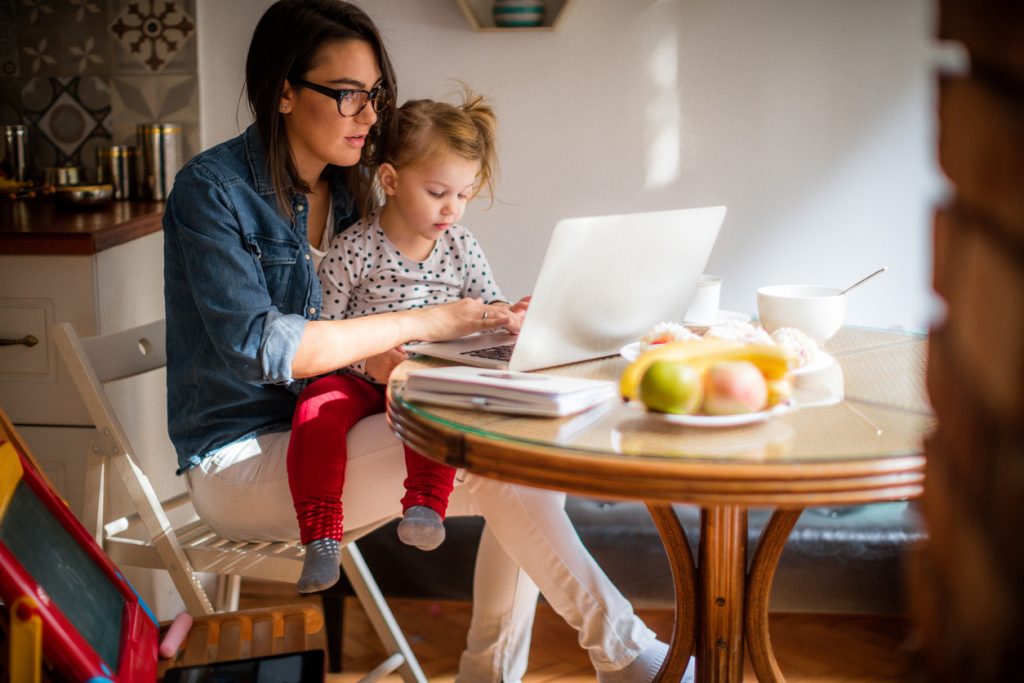Why We Can’t Let This Be Our ‘New Normal’

Three months ago our approach to COVID-19 was about ‘conquering’ the virus. And now that we know it’s going to be with us for some time, we’ve toned down the rhetoric and started referring to activities like social distancing and wiping down our groceries as ‘the new normal.’
And that makes sense for the most part. But we can’t let the way women’s lives have changed become our new normal. Here’s why.
In Canada, not only are women making up more than half of the COVID-19 deaths, they’re also disproportionately impacted by the virus, in this country and around the world, even if they don’t get sick. There are many reasons for this, chief among them the fact that women tend to earn less, do more of the unpaid work and suffer more gender-based violence.
According to a recent United Nations Policy brief, “even the limited gains made in the past decades are at risk of being rolled back” as a result of the pandemic. Furthermore, COVID-19 is “deepening pre-existing inequalities and exposing vulnerabilities in social, political and economic systems which are in turn amplifying the impacts of the pandemic.”
Super.
On a more micro level, there seems to be no shortage of stories and anecdotes about women who are collapsing under the weight of their professional responsibilities (ie. working from home), the added pressure of home-schooling, and the ever-present list of chores and domestic tasks. Curiously, having our male partners at home doesn’t seem to be making it any easier for a lot of women, which is why accepting this as the new normal is so dangerous.
Take this couple in Japan who went tit for tat on who does what, even creating a spreadsheet. When the results were tallied, the somewhat indignant male partner had recorded 21 tasks he regularly completes with their two children and around their apartment, while his wife had noted 210.
What the pandemic has done, unfortunately, is magnify the invisible workload of motherhood. But coaxing this issue out in the open and talking about it has, so far, resulted in very little actual, tangible change in women’s day-to-day lives.
This is a problem not easily solved, because gender roles in both the wider world and within individual families are deeply entrenched. Just because our male partners are home doesn’t mean they’re seeing everything that needs to be done and understanding the toll it takes.
Years ago, if someone had suggested my marriage would consist of my husband going to work and me staying home as the primary caregiver for our children, pets and home, I’d have said you were crazy. But here we are. These days, my husband has a job that pays for critical necessities, such as our mortgage and our orthodontist’s Porsche, and I work from home picking up freelance gigs where I can and doing the lion’s share of the domestic work. That’s just how it is right now and while most days I don’t begrudge it I do chafe when I notice that in my own home and in the homes of most of my friends, having our male partners around hasn’t eased our domestic workload in a meaningful way. There’s more work to be done: more meals to be made, more dishes to do, more fractions to teach, but few of us seem to be splitting the load equally.
Accepting this as a new normal is dangerous not just because we risk the evaporation of any modest gains our gender has made in past decades, but because many of us simply cannot do any more than we’re already doing. We are breaking and collapsing under the strain and it’s affecting our mental and physical health as well as our relationships. We’re exhausted and we need to ask for help.
Instead of letting the pandemic destroy us, we have to use it as a golden opportunity to communicate and collaborate because if there’s one thing we should know about relationships, intimate or otherwise, it’s that we often have to ask for what we need. We can’t expect people to know how to please us or read our minds, no matter how obvious those wants and needs may be to us.
‘Well’, you might say: ‘My partner might not be able to read my mind but he sure as shit should be able to ‘read’ the sink full of dirty dishes and the laundry that’s been in the dryer since Easter.’
Fair point, but while I’m in ‘don’t shoot the messenger’ mode, a gentle reminder that this goes for our kids as well. Everyone needs to do more, but no one is looking to do more. Just as my kid isn’t hoping I’ll ask her to put down her iPad and help out in the kitchen, I’m not looking for bills to pay or sinks to unclog because those are my husband’s jobs.
Similarly, he doesn’t go into a work meeting thinking about overdue dentist appointments, birthday party gifts and when the last time we checked the mailbox was. Not because he doesn’t care but because he knows I’ll do it. He also knows I’ll make dinner but what he may not understand is that before dinner’s even on the table I’ve already scanned the pantry, planned the meal, shopped for the ingredients, considered the food’s overall nutritional value (or lack thereof), figured out how often I’ve made it in the last month, and prepared for the fact that at least one person in our house won’t like some part of it.
That’s the tip of the ‘invisible workload’ iceberg, and quarantine has made it worse because it’s added duties and worries to our plates, forced us to juggle even more balls with the same amount of hours in the day and, in many cases, caused our simmering pots of resentment to boil over.
I know the last thing any of us feels like doing right now is getting into it with our partners about sharing household duties. If you’re living in a “don’t poke the bear, let’s just get through this” situation, a heart-to-heart about chore inequity is probably as appealing as foot fungus. But it doesn’t have to be confrontational. Putting up your hand and saying ‘I’m overwhelmed and I can’t do it anymore’ can be framed as an opportunity to connect, solve problems and strengthen your bond.
Maybe you’re laughing and rolling your eyes at that, but honest to goodness I truly believe the only way we’re going to get through this pandemic with our sanity and our marriages intact is by doing the hard work of communicating our wants and needs RIGHT NOW. And if we do it right, maybe we’ll come out even better on the other side.
I know this isn’t easy to do because every time I say ‘Can you please take out the recycling?’ my husband hears ‘You’re a lazy bastard and you never do anything to help around here.’ How he intuits that subtext is a gosh darn mystery but one of the major pain points of our marriage has always been who does what. Over the years we’ve both learned to be mindful of each other’s sensitivities, but any talk of chores still has the potential to escalate into hours of silence and clipped tones.
The fact is, nothing good ever comes from spontaneous conversations about unbalanced workloads because they’re driven by frustration. When we’re feeling overwhelmed or taken advantage of, that’s when we’re at our worst, and probably our least rational and objective. I’m not saying our concerns aren’t valid but when we’ve done the dinner dishes alone for the 985th consecutive time while everyone else watches television, this may not be the best time to ask for help. Trust me on this.
But if not now, when? When will it be a good time to address what’s really getting to us about this pandemic? When will it be a good time to put our hand up and say ‘I need help. I need YOUR help?’
So find some time to have ‘the talk.’ Wait until you’re calm and unemotional. Do what you have to do to set the mood, I won’t judge. Heck, I’ve been there.
But if we don’t speak up, this becomes our new normal.
And what happens then?
















